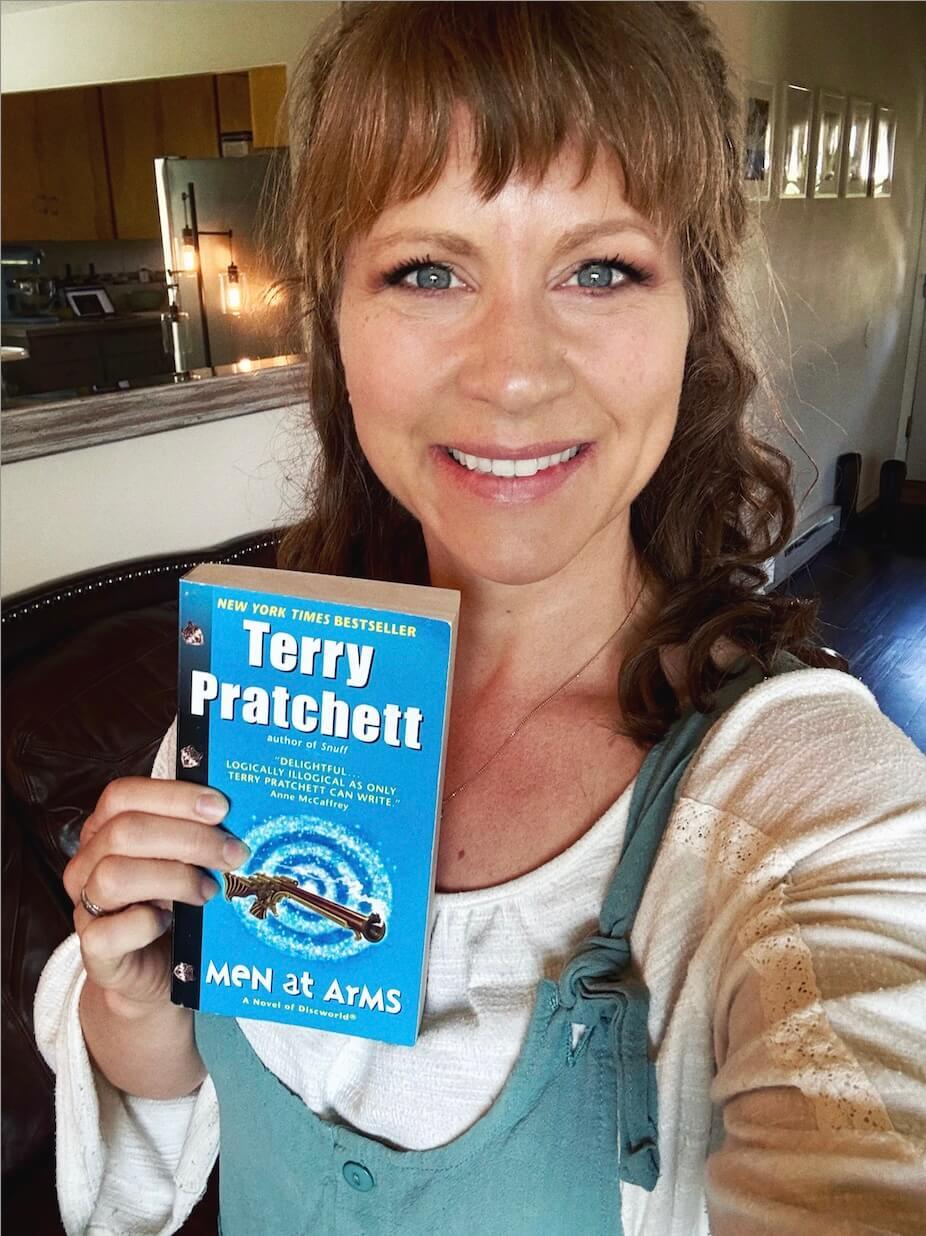- A Skirmish of Wit
- Posts
- Blossoms Like Parachutes
Blossoms Like Parachutes
Terry Pratchett, Shakespeare, when your hero knows too much, and more
Greetings, Skirmishers!
Welcome to the first ever edition of A Skirmish of Wit, my monthly newsletter for readers and fellow storytellers.

Real smiles, fake spring, Easter morning.
Here in Idaho’s drafty chimney, I find myself turning on the Leap Year soundtrack during miserably cold, rainy weather.
I’ve listened to a lot of Leap Year the past few months.
But now, at last, spring seems to have arrived all at once like the 101st Airborne Division. Blossoms explode like parachutes, tulips flare, robins take the treetops by storm, the Palouse hills march in ranks of violent green. It’s a blissful time of year.
We will enjoy this sort of springish behavior (with temperature swings from 40s to 80s) until the second week of July, when it hits 105, Walmart sells out of AC units, the community pool opens for 2 minutes, and everyone swims, then hops out to go buy next year’s winter coats, and we repeat the process.
As my husband says: “April showers bring May snow brings June gloom brings next winter.” He isn’t (entirely) wrong.
What I’m Writing (Plus, Tips)
I’m about 75% through a revision of my next middle grade novel, a swashbuckling retelling of the Orpheus myth. Think The Silver Chair meets The Sea Hawk (starring Errol Flynn, go watch it) on a cursed tropical island. My next step will be to resubmit the manuscript to Canon Press (publishers of my debut novel, Forbidden Child) to see if they like it.

Would you read a story about a boy gifted with immortality whose only kryptonite is the sea?
A few big lessons I’ve learned during the revision process:
1) Sometimes the worst thing you can do is preserve a scene you love. I was quite fond of a few scenes from my first draft of this novel (written in a hazy 2011), but guess what, I was an entirely different person/writer back then, so I’ve ended up deleting most of those scenes after cherishing them for far too long. You were a plucky first draft, now bye bye.
2) Sometimes amusing side characters have to go. If they don’t disagree with or challenge your hero in a unique way, then they’re redundant. Transform or delete.
3) Sometimes the key to tension is subtraction. Take something away. Destroy your hero’s resources, remove moral support, mess with his weapons, withhold vital information that would help him win faster.
A couple weeks ago, I was struggling to revise my lazy, unexciting midpoint. It just didn’t accomplish much. After banging my head against it for a day or two, I realized that the midpoint didn’t give my hero much new information—because he already knew too much.
Look at any number of movies. The midpoint (or any key turning point) often entails the sudden discovery of life-changing info: the Japanese are going to attack Midway; here’s the key to blowing up the Death Star; no, Neo, you aren’t The One, etc.
To fix my midpoint, I simply went back through the first half and niftily removed some of my hero’s knowledge. By making him more lost with lots of unanswered questions, I created problems the midpoint could fix. Boom!
What I’m Reading
Terry Pratchett has been my go-to for a while now. (Currently: Men at Arms.) One, he’s brilliant. Two, he’s quite unlike me: witty, cheeky, satiric, irreverent, and hilarious. Left to my own devices, I will quickly go dark, bombastic, self-serious, and overly dramatic. Pratchett is the perfect antidote. With his voice in my head, I remember to keep my novel fun. Oh, and my metaphors improve.
I’m also slowly chipping my way through Empires of the Sea (the siege of Malta is the Alamo you never heard of, with higher stakes and a happier ending) and the fantastic culinary tutorial Salt Fat Acid Heat. Did you know salting your meat ahead of time can make a world of difference? Being a better cook makes me a better, more well-rounded person, which will in turn make me a better, well-rounded writer, so yes, it’s related to novel-writing.

“The river slunk sullenly in the bottom of its bed, like a student around 11 A.M.” Alongside PG Wodehouse and Tom Wolfe, Pratchett has THE BEST METAPHORS.

Cedar is very fond of dactyls and trochees.
Quote of the Month:
“The high way to comfort is to mind comfort less, and duty more.” - Thomas Brooks
This is the quote that comes to mind whenever I have to sweep the kitchen when I’d rather fix my midpoint. If you focus on your duty instead of what you’d rather be doing, you quickly enjoy your duty!
Movie Recommendations
My husband and I recently feasted on a number of Shakespeare film adaptations—a wild mix of fun, fabulous, grand, inspiring, weird, and depressing. All worth a watch.
Much Ado About Nothing (Kenneth Branagh, Emma Thompson, 1993) - Probably my favorite. If you received your welcome email, you already know why I love it. It’s simply marvelous. (Quick filters needed.)
Henry V (Kenneth Branagh, Derek Jacobi, Emma Thompson, 1989) - Magnificent, kingly, and the source of a rousing anthem you’ll want to sing again and again. The final scene between Kenneth Branagh and Emma Thompson alone is worth the price of admission.
The Hollow Crown: Henry IV (Tom Hiddleston, Jeremy Irons, 2013) - Brilliant cast and terrific performances. I love the story of Prince Hal (the future Henry V) choosing whose son he will be: the amusing but despicable Falstaff’s, or his father the king’s? (Light filters needed.)
Note: Since Tom Hiddleston’s Henry V is awful, I recommend watching his Henry IV, then switch to Kenneth Branagh’s Henry V.
Hamlet (Kenneth Branagh, Kate Winslet, Derek Jacobi, 1996) - A stunning spectacle with bizarre performance choices from Kenneth Branagh and spats of weirdly cheap production. Kate Winslet (Ophelia) is heartbreaking. Overall, I prefer Mel Gibson’s Hamlet, though I haven’t seen it recently enough to review throughly. He is naturally sympathetic in this role. Branagh just got on my nerves. (Filters needed.)
Macbeth (Michael Fassbender, Marion Cotillard, 2015) - Eesh, sooooooo darrrrk. This film made the mistake of thinking if you can hit one note really well, you might as well hit it for two hours. The performances are flat, Scotland rankly phlegmatic, the pacing constipated, and the soundtrack sounds like a walrus sat on a cello. But since Macbeth is worth reading, and it’s more fun to read subtitles than to read a play all by yourself, this is worth a watch. It’s the cautionary tale you won’t forget. (Light filters needed.)

Whom I write for.
Parting Shots
If you’re like me, and you write obsessively, don’t forget to do normal human things: make banana bread, raid the farmers market, enjoy a bonfire with your husband, learn how to knit, plant some calla lilies, host a play date for your kids.
I remember some great advice I got years ago from N.D. Wilson. I asked him, “If you aren’t writing for money yet, and all your deadlines are self-imposed, how do you not appear selfish while writing?” His answer: “Don’t BE selfish. Then who cares what it looks like.”
Go write (don’t be selfish) win!
Cheers,
Gwen
